Key takeaways:
- Ethical branding fosters a connection between consumers and companies, promoting accountability and transparency, which enhances customer engagement.
- Supporting ethical brands provides benefits such as sustainability, community involvement, and superior product quality, enriching both personal and collective experiences.
- Identifying genuine ethical brands requires investigating their practices, transparency, and community engagement, while advocating for ethical consumerism can inspire broader social change.
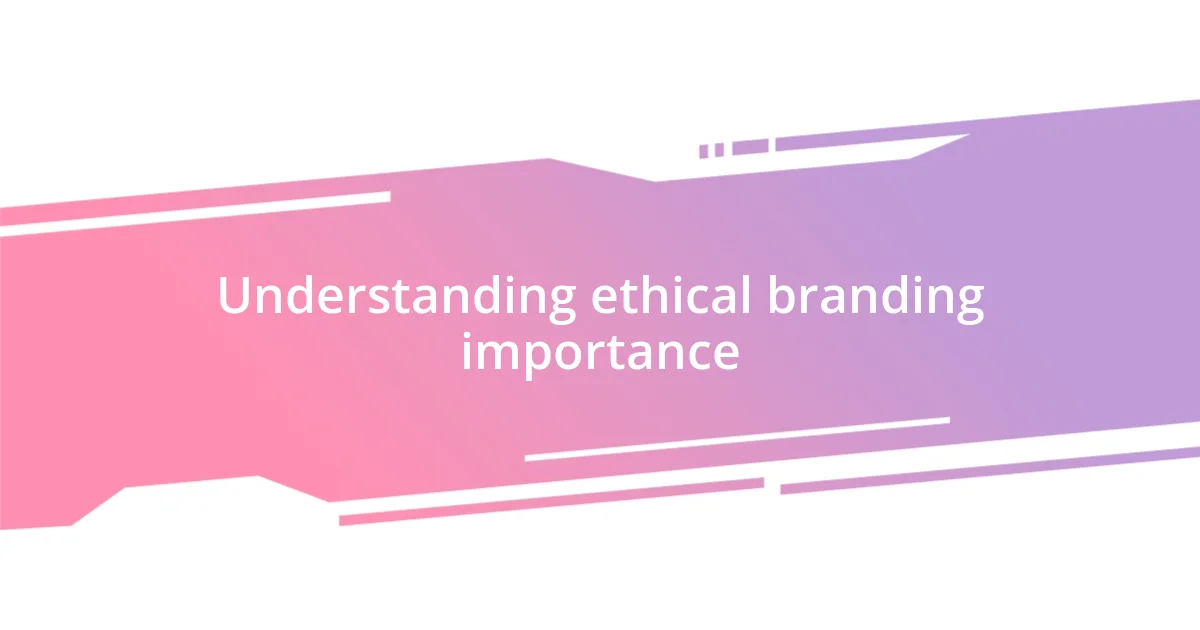
Understanding ethical branding importance
Ethical branding is significant because it aligns businesses with values that resonate deeply with consumers. I’ve often found myself drawn to brands that prioritize sustainability and social responsibility, feeling a sense of pride in supporting companies that champion ethical practices. Isn’t it comforting to know that your purchasing choices can contribute to a greater good?
When I think about my own experiences with ethical brands, I remember a time when I chose a locally-sourced products over mass-produced ones. That decision not only supported my community, but it also sparked genuine conversations with friends, who were curious about the brand’s story. It made me realize how ethical branding creates a sense of connection and trust between consumers and companies.
The importance of ethical branding extends beyond mere profits; it fosters accountability. When a brand openly shares its practices and impacts, it invites customers to engage on a deeper level. Have you ever stopped to wonder how your favorite brands are impacting the world? I find that the transparency of ethical brands often leads me to feel more engaged and invested in their journey, transforming me from a passive buyer to an active supporter.
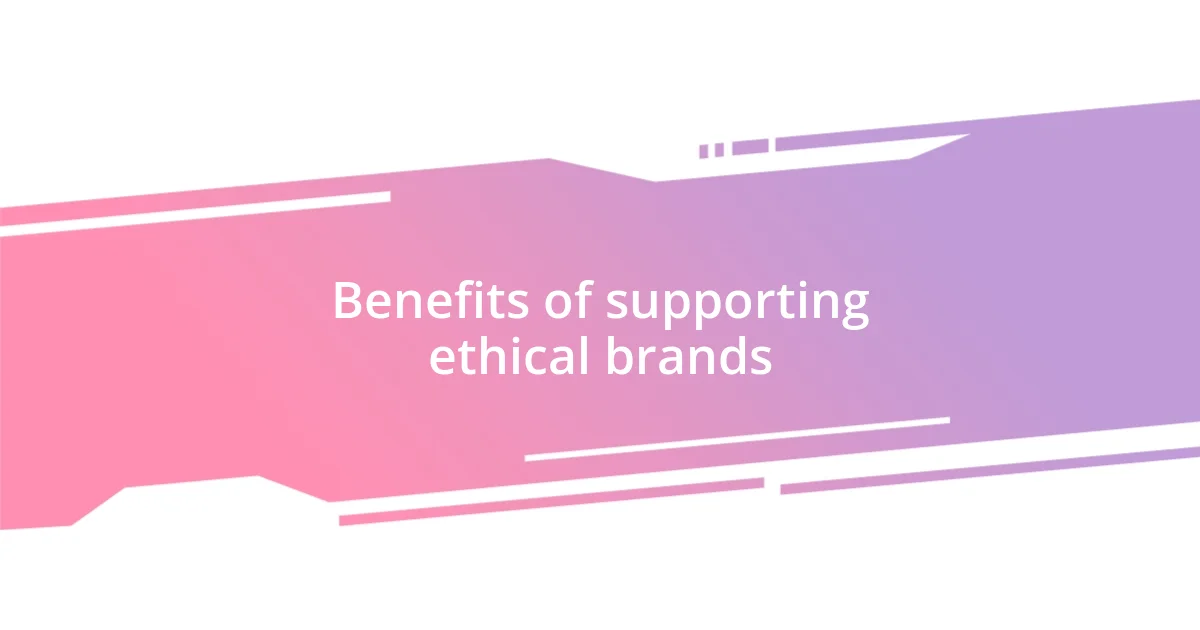
Benefits of supporting ethical brands
Supporting ethical brands unlocks a range of benefits that go beyond just making a purchase. For me, one of the most satisfying aspects is contributing to sustainability. When I buy from brands dedicated to eco-friendly practices, it’s like endorsing a healthier planet with my wallet. I’ve often noticed that shopping consciously makes me feel like I’m part of a larger movement. How can this commitment not bring a sense of fulfillment?
The community involvement that ethical brands champion often resonates on a personal level. I recall attending a local event where a small, ethical brand showcased its products. The warmth in that space, enriched by shared values, felt almost palpable. It reminded me that supporting these businesses helps cultivate a vibrant community, enhancing our social fabric. Isn’t it fantastic to think your choices can help forge connections in your neighborhood?
Moreover, ethical brands frequently provide superior quality. For example, I’ve experienced a noticeable difference in the craftsmanship of handmade products versus their mass-produced counterparts. This superior quality often translates into longer-lasting items, which, in my experience, means less waste over time. The investment I make in these products not only benefits me but also reflects my commitment to sustainability.
| Benefit | Description |
|---|---|
| Sustainability | Contributing to a healthier planet through eco-friendly practices. |
| Community Support | Enhancing community ties by supporting local artisans and businesses. |
| Quality | Often better craftsmanship and longevity in products. |
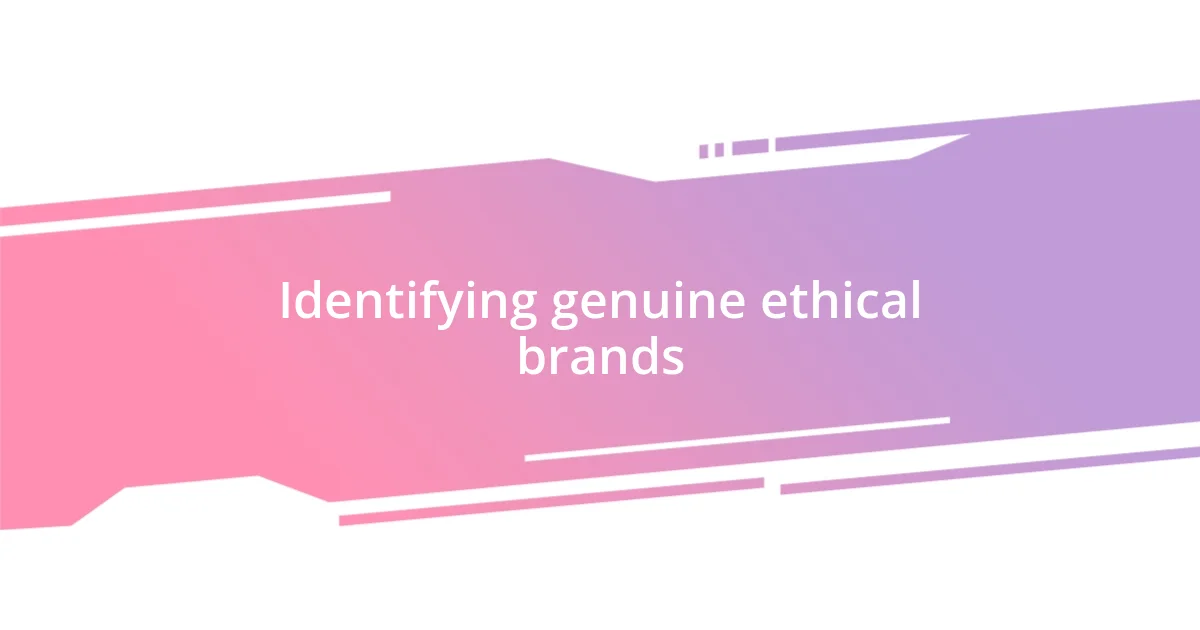
Identifying genuine ethical brands
Identifying genuine ethical brands can be a rewarding challenge. When I dug deeper into brands I was considering, I learned to look beyond just their marketing claims. It’s essential to investigate their practices, values, and community involvement. Engaging with a brand’s story and mission not only helps me assess their authenticity but also makes my shopping experience more enriching.
Here are some key indicators that signal a brand’s genuine commitment to ethical practices:
-
Transparency: Brands that openly disclose their sourcing, production processes, and labor practices often prove they have nothing to hide. I remember being pleasantly surprised by a company’s detailed sustainability report; it made me trust them even more.
-
Certifications: Look for recognized certifications such as Fair Trade, B Corp, or organic labels. These can signify that a brand meets specific social and environmental standards, giving me peace of mind in my purchases.
-
Community Engagement: Genuine ethical brands actively participate in their communities. I once supported a small apparel company that not only sourced its materials locally but also donated a portion of its profits to local charities. It felt wonderful knowing my money was making a difference close to home.
-
Long-term Commitment: Ethical brands often demonstrate their values through consistent actions rather than marketing gimmicks. I find that when companies continually innovate in sustainability or social responsibility, it reflects their dedication to being part of the solution, not just riding a trend.
Identifying the right brands requires a little digging, but I always leave feeling a sense of fulfillment when I find ones that truly embody ethical principles. It’s not just about the products; it’s about the values we support together.

Evaluating brand transparency practices
Evaluating brand transparency practices is crucial in my journey to support ethical brands. I recall a moment when I visited a brand’s website, diving into their transparency section. It was refreshing to see the behind-the-scenes details about their sourcing and labor practices, and it made me feel like I was part of something meaningful. Have you ever stumbled upon a brand that laid out their operations so clearly? It can truly deepen your trust.
When I engage with a brand, I focus on their willingness to embrace transparency. There was this one company that shared not just their successes but also their challenges in becoming more sustainable. This kind of honesty reassures me that they are genuine in their mission. Brands that take the time to transparently communicate their journey are usually the ones worth supporting, don’t you think?
Moreover, I find that brands offering detailed product origin stories engage me the most. For instance, I once learned about a coffee company that highlighted the farmers behind each bean. Understanding their story and the fair wages they earn not only made my experience richer but also enhanced my appreciation for the product. Isn’t it incredible how transparency can transform a simple purchase into a meaningful connection?
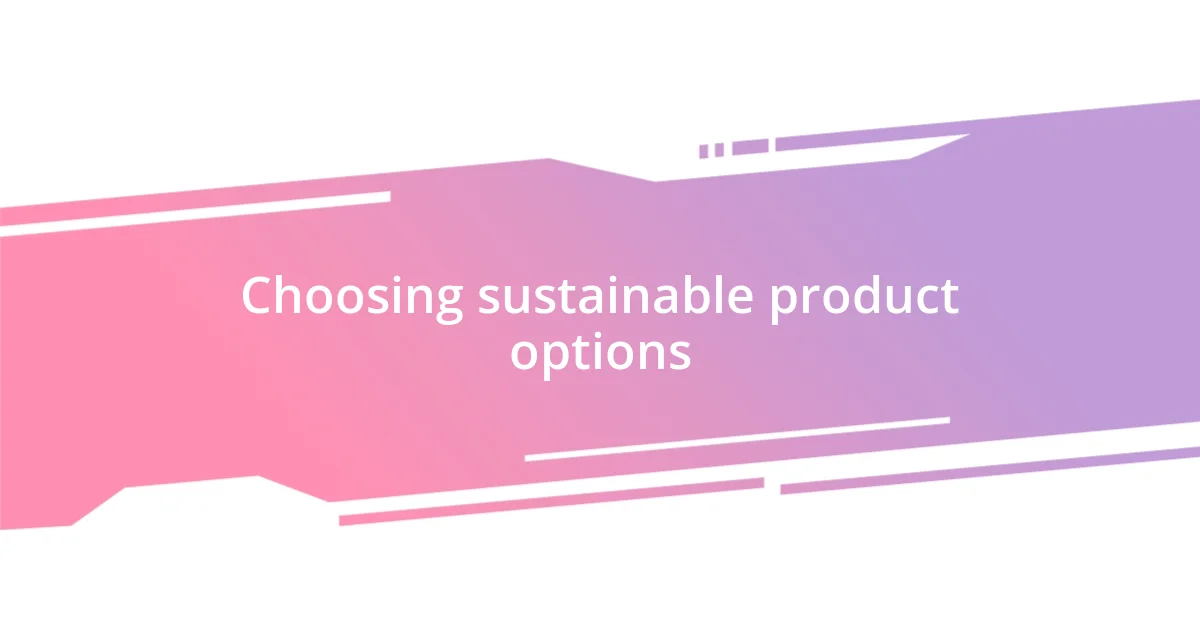
Choosing sustainable product options
Choosing sustainable product options often means delving into the story behind the product. When I first started pursuing eco-friendly alternatives, I discovered the importance of materials used in production. Imagine my delight when I found a skincare line that sourced its ingredients from regenerative farms. Not only did this protect the environment, but it also enhanced my skin’s health. Have you ever considered how the source of a product can impact your well-being? Knowing that my choices support sustainable farming practices gives me such a sense of empowerment.
The decision-making process around sustainable products can sometimes seem overwhelming, but I’ve learned a few simple strategies. One of my favorites is to prioritize local products whenever possible. For example, during a recent visit to a farmer’s market, I chose handcrafted candles made from soy wax instead of their paraffin counterparts. The thrill of supporting a local artisan while also reducing my carbon footprint was an exhilarating mix. Have you felt that buzz of excitement when you realize your shopping habits can spark change?
I also appreciate brands that emphasize minimalism in their product lines. A few years ago, I encountered a clothing company that focused on timeless pieces designed to last rather than trends that fade quickly. Their philosophy resonated with me deeply, as it challenged the fast-fashion mentality we often see today. Isn’t it rewarding to invest in items that not only serve a purpose but also make a lasting statement about your values? By opting for such mindful choices, I feel like I’m part of a broader movement towards sustainability.
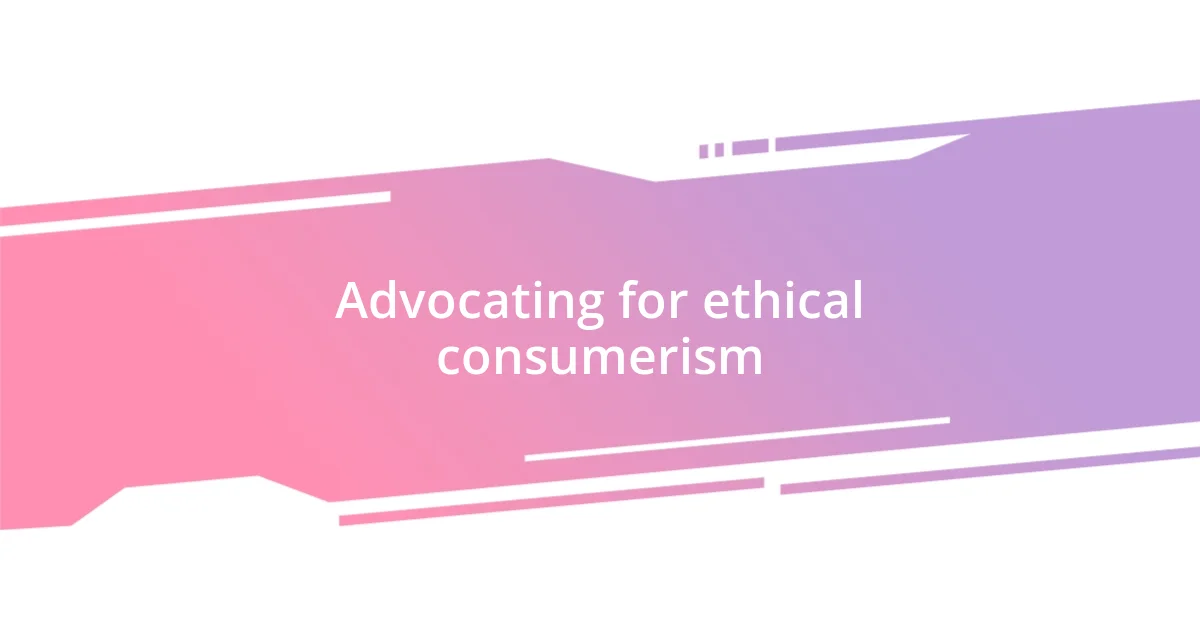
Advocating for ethical consumerism
Advocating for ethical consumerism goes beyond just making smart purchases; it’s about aligning my values with those of the brands I support. Recently, I joined a local group dedicated to raising awareness about fair trade products, and listening to others share their experiences was enlightening. Have you ever felt that rush of connection when discussing something you’re passionate about? It reinforced my belief that every dollar spent is a vote for the kind of world I want to live in.
Another moment that stands out for me was when I decided to stop buying from brands that exploit workers. It was a tough transition since some of these brands were favorites of mine. But once I made that change, I felt lighter, knowing my choices were contributing to a better future. I often wonder how many of us take the time to reflect on the impact of our purchases. Wouldn’t we all feel more empowered if we did?
I also advocate for ethical consumerism by sharing the stories of brands that resonate with me. Connecting with friends and family about the impact of supporting ethical brands has sparked meaningful conversations. I remember vividly gifting a fair-trade handbag to a friend, and watching her eyes light up when she learned about the artisans behind it. It’s moments like these that truly highlight the ripple effect of advocacy—don’t you think that sharing these stories can inspire change in the way we all shop?














